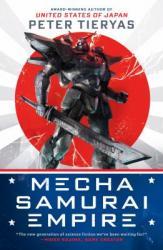
***THIS BOOK WAS RECEIVED FROM THE PUBLISHER***
For a genre that’s usually associated with Japanese anime and manga, I haven’t seen many “mecha” novels (or movies, for that matter, with Pacific Rim (2013) being the only notable example). Consequently, when I received an advance reader copy of Mecha Samurai Empire, I was looking forward to reading it. While there were still a few grammatical and proofreading errors in this book—of which I’m sure have been fixed in the final version—portions of the plot didn’t sit well with me. My main qualm is the main character who really isn’t good at anything but still gets to pilot a huge and complicated piece of machinery just because he wants to.
A clear and obvious mix between The Man in the High Castle and Neon Genesis Evangelion, the few strong elements of this book were in the mecha battles themselves. The problem is that the references sprinkled throughout are so obvious (I had to roll my eyes at the Mega Man 2 reference) as to distract from the story. I don’t mind if other stories influence writers, but at least make their influence less obvious when crafting something “new.” At its worst, Mecha Samurai Empire holds to all the tropes and clichés present in mecha anime and manga. If you're into that kind of thing, this probably isn't a problem.
While I still enjoy the spectacle of giant robots fighting, a good story needs to come down to its characters. Since I didn’t particularly like the main character, I tried to grab onto some of the minor ones. Unfortunately, while some of the character arcs were highly predictable, most of the minor characters didn’t stand out either (and the one that did was super annoying). Just like Pacific Rim: Uprising (2018) made me lose faith that we’ll see live-action adaptations of mecha anime like Evangelion or Gurren Lagann, Mecha Samurai Empire shows we still have a way to go before novels of this genre are prevalent.
An obvious mashup with pretty good action, I give Mecha Samurai Empire 3.0 stars out of 5.
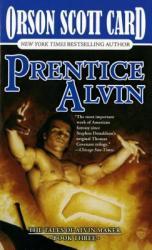
As I’ve been reading through the Tales of Alvin Maker series, I have found it interesting to see what big societal issues have been covered so far. While Seventh Son tackled religion and Red Prophet delved into politics and war, Prentice Alvin bit off a big chunk of racism and tried to address it in a way that’s half fantasy and half historical fiction. Sure, there’s still some semblance of the religion content present in this book that informs the racism dialogue. Still, these large issues end up taking a back seat to the more fascinating aspects of the titular character learning how to control his incredible powers.
In fact, this might be my favorite book of the series so far. It’s always more entertaining to watch a character come into the depth of their abilities, and Prentice Alvin has this in spades (both metaphorically and literally). While there weren’t many instances of Alvin directly being affected by a conflict that would require him to grow as a character, there were enough inevitable plot points that made me wonder how he would handle the situation. These twists helped to enforce the world-building that Orson Scott Card has excelled at for some time.
Perhaps the reason why I like this book as compared to its two predecessors comes down to how it focused more on the “magic” of this alternate history and less on the similarities to the American historical context. I’ve never been much of a fan of historical fiction, but I do appreciate explaining the events of the past through the lens of magical realism or fantasy. It’s likely why I’ll keep reading this series for the time being. At the very least, I’m curious how Alvin will grow from here, as he’s developed into a strong character who can basically do anything he wants.
A magical take on addressing the racism of America’s past, I give Prentice Alvin 4.5 stars out of 5.
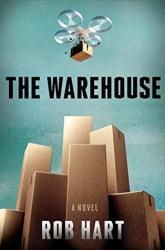
Imagine a world where Amazon controls pretty much everything (its really not hard to do, right?). They are the only large employer, and they have managed to put just about every other retail company out of business. Most folks who need employment have to head to their nearest Cloud center (Amazon = Cloud), apply, and hope against hope they are accepted. This is the fate of our two main protagonists, Zinnia and Paxton. Paxton wants more than anything to keep his head down until he can get patent money for his invention, a business that was going well until Cloud forced him out of business. Zinnia’s reasons for working at Cloud are a bit more inspired (it would depend on your perspective) as she’s been hired to try to take Cloud down from the inside. As Paxton and Zinnia are thrown together, both will come to realize that the Cloud was more insidious than they thought and they’ll have to sacrifice more than they’re comfortable with the bring it down.
I read this book right after watching John Oliver’s sendup of this sort of corporate culture and dang, Rob Hart did his research. His version of Amazon matches quite closely with what Oliver presents as the actual version of Amazon. I mean, it’s not great. Its really fascinating to read this near-future take on what Amazon and their ilk could mean for our country and economy as, like I said, this is a future that is really easy to imagine.
The book takes turn between Zinnia, Paxton and Gibson Wells’ (think Jeff Bezos) narratives. The characters are believable and likable enough (save Wells, but that’s obviously intentional) that I was not overly fond of one perspective over the other and never found myself racing through one perspective to get to a different one. Nonetheless, the book ends up being a quick read. It was sort of John Grisham meets Brave New World, and I was not mad about it. It’d make a fantastic movie, and clearly someone agrees with me as the author thanks Ron Howard and Bryan Glazer in his afterword.
If you are looking for a quick summer read that’ll make you think (but not too hard), this dystopian thriller will suit your needs. 4 stars – I really liked it!
Thanks to Crown and Netgalley for the free eARC which I received in exchange for an unbiased review. The Warehouse will be release on 20 August, and you can put your copy on hold today!
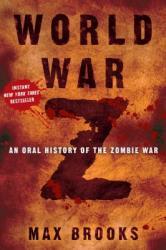
Max Brooks is an agent of the United Nations, tasked with collecting the stories of those who lived through the Zombie War. Having broken out when a young Chinese boy was bitten while swimming, it spread through illegal organ and human trafficking, hidden by governments, until a massive outbreak occurs in South Africa, shining a light in a plague that would bring humanity to the brink of extinction. Max Brooks’ World War Z chronicles the stories of people from all walks of life, from military scientists, to blind old Japanese men, to astronauts aboard the ISS, and their stories of how they survived the terrors of the assault of the living dead.
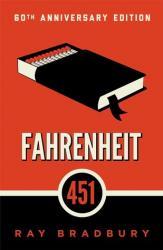
Fahrenheit 451 is a classic book that most people have heard the title of. With a similar style to Aldous Huxley’s “Brave New World”, Fahrenheit 451 takes the reader into a future where books are outlawed and the people of this alternate future are basically mindless robots. The people of this future have an intake of mindless media that even surpasses that of us currently. The main character is a firefighter but different from what we are used to. These firefighters fight with fire, burning houses and books if they are found since they are against the law. But soon after meeting a girl who does not conform to this society’s media consumption, the main character begins to rebel and go against the norm. Fahrenheit 451 is a spooky prediction of what the future will hold and after reading it, I can already see us as a society heading on this path. A truly incredible read, Fahrenheit 451 is a novel that cannot be missed.
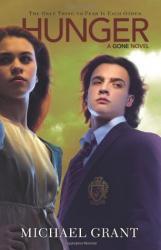
Michael Grant has written another thriller with Hunger. Continuing the story of Gone, everyone is still trapped inside of the FAYZ. However, a new enemy has filled the minds of every person: hunger. As they search for a solution to their hunger, Sam, Astrid, and the others must still resist Caine and the rest of his crew as well as a powerful being known as the Darkness.
Michael Grant keeps you in suspense throughout the entire novel and will leave you hungry for more. I highly recommend this book for any high school aged reader.
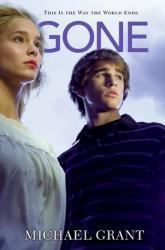
Michael Grant has renewed a classic for the next generation of readers. Gone has a very similar structure to Lord of the Flies but has enhanced the story in many ways. Gone presents added science fiction elements to the story that will draw in many readers and provides conflict that will force you to keep reading. I thoroughly enjoyed this book. However, some readers may find some elements of the story slightly disturbing. Therefore, I recommend this book for high school aged readers and up.
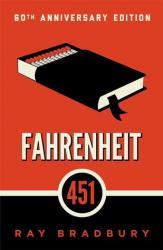
I originally purchased Fahrenheit 451 because it was an option on a summer reading assignment; the book seemed interesting based on the description but it wasn’t a book I would normally pick up. Fahrenheit 451 takes place in a world where firefighters no longer put on fires but burn books. Guy Montag is one of these firefighters though he has never really considered why he became firefighter or why books are burned. On his usual way home Guy meets Clarisse, a young neighbor, who is curious about why thing are how they are.
Clarisse asks Guy why he became firefighter and if he has read a book. While at first Guy finds Clarisse’s curiosity foolish, he begins to realize he had been a the fool all along. This book has been eye opening, I have never thought about the subtle censoring in books, and the way many things are mindless, pointless, and short. While with many books are so action packed you can’t put them down, this is not the case with Fahrenheit 451. With this book I was able to slow down, imagining everything detail, and just think about the theme. This book is a classic for a reason, the message is meaningful. The events that created the setting of Fahrenheit 451 seemed a little too relatable, and it really got me thinking about censoring in our society. This on the shorter side and it is definitely worth your time.
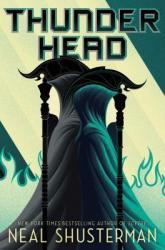
The exciting sequel to Neil Shusterman's Scythe, Thunderhead, follows Citra and Rowan in a futuristic world ran by an Artificial Intelligence named Thunderhead. In this new Earth, death has been conquered, and there is actually no way to die, unless of course you have been killed by a scythe. Scythes are mysterious people hired by the government to keep the population down by gleaning, which is a polite way to say killing. Everyone fears the scythes. Citra is a newly trained scythe. Her scythe name is Anastasia, because each scythe name is named after someone before death was finished off. Rowan on the other hand is a rouge scythe named Lucifer, who tried out to be a scythe and did not make it. He executes scythes of the new order, people who believe in mass gleanings. Citra and Rowan both are followed in the story, while trying to defeat the new order in the amazing novel: Thunderhead, by Neil Shusterman.
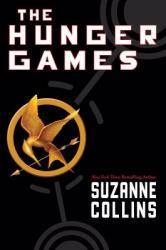
16 year old Katniss Everdeen has had to fend for her mom and sister, Primrose Everdeen ever since her father died in a mining accident when she was 12. She has had to learn to hunt to keep her family alive with the bow and arrows that her father made before he died. It is the Reaping, and Katniss knows she is in danger of being reaped because of her extra names in the Reaping. After her father died she was forced to sign up for more food so that she and her family could live and she will pay the price now. It is Primrose's first reaping now that she is 12, and against all odds she is reaped. But Katniss volunteers so she won't have to go the the Hunger Games were a male and female tribute for each of the 12 districts are forced into an arena to kill each other in tell one lone victor remains. But when it is time for a boy to be reaped, he has a connection to Katniss' life. His name is Peeta Mellark a boy who worked in the bakery in District 12. As they get to know each other and prepare for the games they start working together so maybe one of them can survive the games.
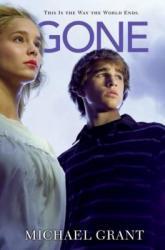
Gone, by Michael Grant is a fast paced dystopian sci-fi story about a small town in California by the name of Perdido Beach . The plot quickly pulls you in, leaving you emotionally invested in the characters. Personally, the second I was finished, I was onto the next book! The main character is a young boy named Sam Temple. After all of the people aged 15+ vanish, the remaining teens and children look up to him as their leader, even though he constantly tries to deny the huge responsibility. After a gang of bullies start to take over the town and kill and mutilate the people who won't bow down to them, he takes a stand to protect the rest of the innocents. Gone is the first in a series of five books. I would recommend this book, and by extension series, to anyone that enjoys superpowers, violence, and heartbreaking sacrifices.
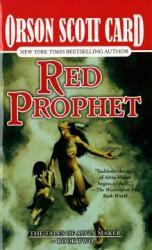
Continuing from the previous book in the Alvin Maker series, Red Prophet flashes back and shows certain events from a different point of view before driving forward into some fascinating alternate history. I continue to enjoy the fantastical elements brought into American history, even to the point of explaining how certain famous historical figures were the way they were. Although, if you know enough history, you’ll realize the fates of some of the characters presented in Red Prophet (William Henry Harrison, for instance) might not need the foreshadowing missing from this text.
While Seventh Son managed to set up this alternate history and establish some of its rules, Red Prophet delves into the action and excitement that comes from some of the more “kinetic” talents of these characters. Once the plot catches up with where Seventh Son left off, I was hooked. The interactions between Alvin and the Native Americans were quite interesting, and I found everything up until the climactic battle to be top-notch storytelling. Sure, it took a little while to get there, having to first set up the eponymous “Red Prophet” and his powers of observation, but it was worth it in the end.
My one qualm with this book lies in some of its more peculiar metaphor, allegory, and allusion. Near the end of the book, several scenes and sections feel entirely disjointed from the narrative. Perhaps they were to serve some “higher purpose” to lay out the moral of the story—or even the series as a whole. These scenes had characters who suddenly were ripped out of their normal behavior and put into a completely different context. And for what? To show that the history of the Native Americans is rich and varied while also infused with war and darkness? There had to be some other way to convey this than the way it was done here.
An action-packed follow-on to Seventh Son that gets a little too “heady” at times, I give Red Prophet 4.0 stars out of 5.
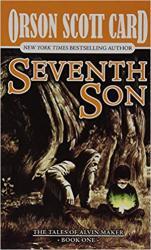
Having loved Orson Scott Card's Ender Saga, I decided to start into another of his series, Tales of Alvin Maker. I was used to his science fiction writing, so I thought it would be interesting to see how he handled semi-historical fiction. For the first book in a series, Seventh Son certainly has its strengths and weaknesses. It’s clear this book came on the heels of the Ender Saga, as there are a lot of parallels between characters and motifs that I just couldn’t ignore. Not that that’s necessarily a bad thing by any means.
While the history of colonial America is the setting of Seventh Son, the fantasy elements added to it made for an interesting read. I did appreciate the distinctive “good vs. evil” conflict between the Makers and the Unmaker, even if it’s a little too tried and true. At the very least, while the religious characters had some amount of strawman characterization set against them, they were well rounded enough not to make the whole story seem too anti-Christian. They weren’t necessarily the enemies, but their ignorance factored into the enemy’s tactics.
Perhaps the little snippets of American history sprinkled throughout this book were what intrigued me the most. Sure, the superstition and “magic” involved in creating an alternate timeline of history made quite a bit of sense. However, without at least a cursory knowledge of these events and historical figures, then readers could potentially miss a lot of substance. As with the Ender Saga, Card uses his writing to dive into different theologies and philosophies that do more than merely entertain. The fact that books like this can be thought-provoking through solid characters is a testament to his talent as a writer.
An adequate start to a series with plenty of potential, I give Seventh Son 4.0 stars out of 5.
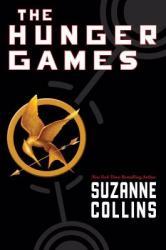
Katniss, a teen girl who's dad died in a mining accident, left her to fend or her mother and little sister Primrose. She hunts and trades for her family with her friend Gale she met soon after the mining accident happened. The annual "Reaping" was a turn of events in the story and essentially what it is, is a night once a year where one girl and one boy aging from 12-18 from every 12 districts are chosen by chance to participate in "The Hunger Games." The Hunger Games is where all 24 children are forced to fight to the death in an arena and there is only one winner.
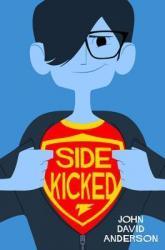
Andrew Bean is a normal kid on the outside but on the inside he is the Sensationalist, a sidekick with super senses. Andrew joins a superhero organization called H.E.R.O this affiliation trains people with superpowers so they can be sidekicks for superheros and someday supers themselves. His hero, The Titan used to be the best (and coolest) superhero but after an unfortunate accident while fighting a notorious criminal called The Dealer he disappeared. This left the sensationalist with no hero to help him when he needs it most especially when the Dealer returns seeking revenge on The Titan. In the middle of this all he still has to be careful not to blow his cover, even to his parents.
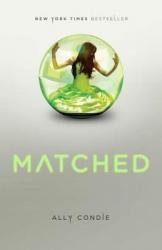
This book is truly amazing! It leaves you wondering what will happen next, to where you cannot put the book down! This is the first book of a trilogy by Ally Condie, all of which are fantastic. I usually don't like reading but I checked this out, and could not put it down! I read it in a week or so because it was so enthralling. I would recommend this book to anyone! It's futuristic, comical, dramatic, and romantic all at the same time.
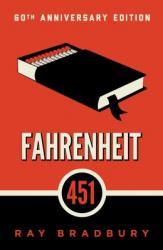
Guy Montag, a fireman who lives in the future where all books are banned, is required to burn them all. Guy then meets a strange girl who explains how books aren't so bad. He begins to spend more time with her and as more fire calls end up worse and worse, his point of view on books is eventually changed. Guy becomes a rebel to the fire company, as he tries to stand up to what is right. He later meets with an ex-professor who helps him generate a plan. Will he succeed? Read this book to find out. I would recommend this to anyone who wants to read about an alternate point of view on the future and readers who like technology as well as robots.
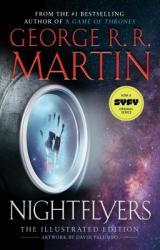
Those who are familiar with George R.R. Martin's Song of Ice and Fire fantasy series may be lamenting the end of the semi-faithful Game of Thrones television show. In the time we’ll all have to wait until the next Song of Ice and Fire book comes out, there are other little stories from this author to satiate our appetite. Nightflyers is a short novella by Martin that also seems to be hinging itself on the success of Game of Thrones, albeit in the science fiction genre instead of high fantasy.
Considering how verbose Martin can get with his works, it was almost refreshing to read a story that was so focused and short. Granted, even though Nightflyers is science fiction, all of the notable George R.R. Martin elements were present: mainly, sex and violence. Depending on your tolerance of these elements, I can say that they’re at least naturally integrated with this novella. Martin certainly seemed to have an adequate grasp of sci-fi to give this story a satisfying twist that drove the plot into the denouement.
Without giving too much away, I did appreciate the science (and pseudo-science) that was used to create an interesting story. Or, at least, the story was written in such a way—with a dash of horror sprinkled in to engage the reader—that prevented me from being bored with it. If it had been expanded out into a full-size book, I’m sure I could see where plenty of fluff could have been added in to reach the required word count. In the end, I’m glad that Martin kept this short, which works primarily to the story’s benefit.
A quintessential George R.R. Martin sci-fi novella, I give Nightflyers 4.0 stars out of 5.
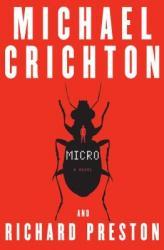
I liked Michael Crichton's writing. And what I mean by this is that I liked Jurassic Park (and to a lesser extent, The Lost World). Recently, I’ve been delving into a few of his other works, like Timeline and Micro. I understand that authors like Crichton excel in their genre—in this case, the technological thriller—but at what point does it just become the same old song and dance? Sure, I know a different author completed Micro and released posthumously. However, it mostly just felt like another re-hash of Jurassic Park mixed with Honey, I Shrunk the Kids (1989).
To Crichton’s credit, I feel his exploration of complex scientific principles in his writing are easy to understand and mostly accurate. For Micro, each bit of information that drove the plot seemed to make sense from a scientific standpoint. This was a plus considering how often the “shrink ray” sci-fi trope is done incorrectly. Of course, most places were pretty obvious where the science was being inserted since they didn’t necessarily flow as well as the other parts of the book.
My main qualm with Micro, aside from it containing all the standard Crichton tropes (e.g., “evil corporations”), is how the characters were practically indistinguishable from each other. The fact that they all primarily came from the same scientific laboratory and were thrust into the dangerous world of the microscopic didn’t help to keep track of who died and who lived. It was almost as if the author needed a large group of faceless characters to feed into the “drama” of trying to survive and return to standard size. None of their demises stuck with me other than being particularly grotesque and cringe-worthy.
A semi-unoriginal mashup of Jurassic Park and Honey, I Shrunk the Kids, I give Micro 3.0 stars out of 5.

Of the original Star Wars trilogy, Return of the Jedi has been my favorite for as long as I can remember. I enjoyed how there was some finality to the stories started back in A New Hope, and Empire Strikes Back. Plus, there were a ton of neat creatures (like the Rancor and Sarlacc) and machines (like the Speeder bikes and AT-STs) that grabbed my attention from a young age. Sure, I can understand the depth of Empire Strikes Back now that I’m an adult, but Return of the Jedi always holds that element of nostalgia for me.
So, how does the Shakespearean version of my favorite Star Wars story stack up? If anything, Shakespeare’s The Jedi Doth Return is consistent with its predecessors, Verily, a New Hope and The Empire Striketh Back . I enjoyed the voice acting and the little changes that made the audiobook more than just a Shakespearean reading of the screenplay. Of course, having listened to three books of this fantastic mashup, it has almost overstayed its welcome. Almost. I still think it’s a genius fusion of two pop culture masterpieces, but at what point does it lose its originality?
Sure, The Jedi Doth Return adds some new bits like songs (which land just about as well as the “added” songs in the 1997 Special Edition re-release). Overall, though, I was a little taken aback at how little dialogue there was in it. Most of the action was described either in chorus or soliloquy, which merely highlighted how much action was present in the original movie. This is great for an action-packed conclusion on the big screen, but it doesn’t land quite as well on the printed page (or audiobook). Despite this, I still think fans of either Star Wars or Shakespeare (or both) should give it a read.
Another consistently funny mash-up of archaic speech and futuristic sci-fi, I give Shakespeare’s The Jedi Doth Return 4.5 stars out of 5.


